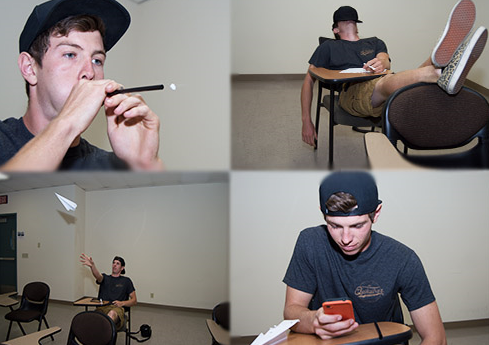By Elizabeth Roush
Staff Writer
Spring semester is just beginning. We’re all getting a feel for our new class schedules and professors, our legs are re-acclimating to the scores of unavoidable stairs and our binders are yet to become the chaotic masses of loose papers that they’ll inevitably grow into.
A new semester has the feel of a new year— a clean slate, another chance to excel. We want better grades than last semester and to get more involved on campus. We want to do more than make awkward eye contact with that hot piece of classmate sitting across the room. A lot of hope and expectation can be mingled in the first few weeks of a new semester, and with a fresh semester in front of us, maybe it’s time to make a new new-semester resolution.
There’s a right and a wrong way to behave when we sit down for class, and maybe it’s time for us to start thinking about what that is.
Classroom etiquette is the sort of thing we all learned back in kindergarten, when a wide-eyed, enthusiastic teacher taught us about “criss-cross applesauce, hands in your basket” and the alphabet. It starts with simple things, like paying attention, not talking while the professor or another student is and not making unnecessary, distracting noises. A comment to your neighbor can wait until after class, and it wouldn’t kill you to actually listen to the lecture.
And what about phones, tablets and laptops? Simple ideas of classroom etiquette get more complicated with the infusion of technology into the learning environment. Personally, I love technology in the classroom. It’s engaging, easy to manage and more organized than a binder. But that doesn’t mean that any and all technology-driven activities are sanctioned in the classroom.
The same grade-school rules can be applied to technology. Don’t talk while the professor is speaking; texting is a digital form of talking. Even if your professor doesn’t hear your conversation, you’re still being disrespectful. Be attentive; checking your Facebook rather than taking notes on your laptop, or working on an assignment for another class, is not paying attention.
The concept behind these absolutely novel actions is really very simple: respect people. Instead of putting the focus on petty rules, you can think of classroom etiquette as an act of honoring people as valuable human beings. Respect your professors enough to not interrupt them, respect your peers enough to not distract them and respect yourself enough to actually learn and grow even in the smallest way.


